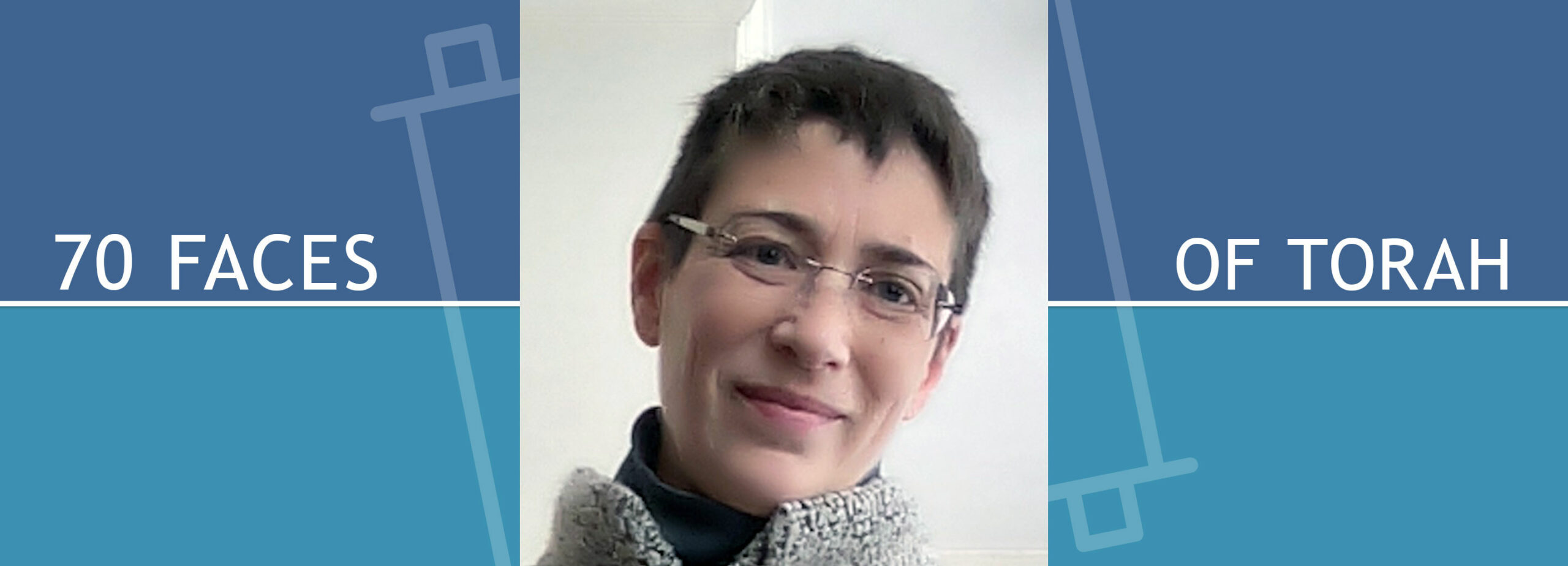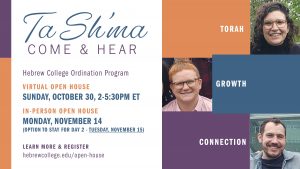Jewish learning Drawing out the Tender Side

Parashat Vayeira
(Genesis 18:1-22:24)
Time barrels on as the seasons change and the natural world starts to go underground for winter, at least here in Boston, where I am writing. The moon of Marcheshvan is reaching its fullness, but for many of us, the themes and melodies of the High Holidays are still faintly ringing in our ears. One such echo is the Thirteen Attributes of God: Adonai, Adonai, El rachum v’chanun… (Adonai, Adonai, God of compassion and grace…) The faith that inheres in these words from the book of Exodus (34:6-7) is perhaps undercut by the plaintive quality of the melody we hear chanted in many Ashkenazi synagogues, a melody that, for me, cuts straight to the soul. The plaintiveness, it turns out, is borne out by what happens after the famous part:
לֹא יְנַקֶּה פֹּקֵד עֲוֹן אָבוֹת עַל־בָּנִים וְעַל־בְּנֵי בָנִים עַל־שִׁלֵּשִׁים וְעַל־רִבֵּעִים
Not acquitting, [but rather] visiting the iniquities of the parents onto their children, and their children’s children, to the third and fourth generations.
This rather more troubling image of God has been playing in my mind as I encounter Parashat Vayeira this year. The parashah holds parallel parental iniquities that play out across generations of trauma, made all the more ironic by the verse in which God articulates Abraham’s role as exemplar for generations to come:
כִּי יְדַעְתִּיו לְמַעַן אֲשֶׁר יְצַוֶּה אֶת־בָּנָיו וְאֶת־בֵּיתוֹ אַחֲרָיו וְשָׁמְרוּ דֶּרֶךְ יְהֹוָה לַעֲשׂוֹת צְדָקָה וּמִשְׁפָּט
לְמַעַן הָבִיא יְהֹוָה עַל־אַבְרָהָם אֵת אֲשֶׁר־דִּבֶּר עָלָיו׃
For I have discerned that he [Abraham] will command his children and his household after him, and they will keep to the path of Adonai, to enact righteousness and justice, in order that Adonai may bring to Abraham what has been promised to him (Genesis 18:19).
Just a few chapters ahead, though, Abraham, this seeming paragon of mitzvot, will find himself in an impossible position, commanded to do one of the most abhorrent things a parent can imagine: sacrifice his own child. But hints of parental iniquity begin even before that.
When the three Holy Messengers who come to call on Abraham arrive in Sodom, they are offered protection and a place to stay by Abraham’s nephew Lot. In a nightmarish scene, the visitors are set upon by the townspeople, who are in a frenzy to rape them. Lot begins to act out his own kind of child sacrifice, and he tries to offer his virgin daughters in place of the three strangers. The generous hospitality of Abraham is turned on its head in this disturbing scene, as Lot’s kindly impulses toward the visitors override whatever parental instincts he might have. The daughters are saved only by the Holy Messengers’ brave hands, which pull Lot back inside and bar the door before the unthinkable occurs.
But the trauma reverberates down the generations. The walls of Sodom’s sin close in, and Lot whisks his family away. As the ashes rise from Sodom and Gemorah, Lot’s wife looks back at their lost city and dissolves into salt. Lot and his daughters forge on, eventually taking refuge in a cave where recent horrific events come to a bizarre conclusion. These motherless daughters, fueled by wine and loneliness, devise to become mothers themselves by their fatherless father. The resulting line is two tribes, the Ammonites and the Moabites, peoples who were eternally cursed by God to be enemies of the Israelites (Deuteronomy 23:5).
The Vayeira doomscrolling continues. In chapter 22, God asks the unbearable of Abraham, and he is prepared to deliver. The text rubs it in: “Please take your son, your only one, whom you love, Isaac, and go to the land of Moriah,” (Genesis 22:2) Each phrase turns the screw a bit tighter, heightening the stakes. Of course, Abraham had already rehearsed this travesty when he sent Hagar and Ishmael away. But this, this is heavier still. Uninfluenced by Sarah, this is between Abraham and the God whose covenant he thinks he is upholding. Grimly, Abraham is willing to take on this terrible task. And as Isaac starts to ask questions, Abraham says, essentially, it’s not ours to question.
Let go and let God. Let’s go.
While Isaac is saved in the nick of time when God’s Messenger stays Abraham’s hand, the trauma again reverberates. The family is ruptured: Isaac disappears from the story in a way that suggests he is not present when his mother Sarah dies. His adult identity is a passive one; the thread that held him together seems, understandably, to have broken when his father held the knife over him.
Both these childhood traumas were repaid in successive generations with more trauma, and more after that. Why would our Torah, our book of instruction, take us to such a dark place? The stories of Lot’s daughters and Abraham’s sons are clearly not meant as shining examples, but rather as dire warnings. What might these parables be teaching us? Perhaps that, in the words of the immortal Stephen Sondheim, “Careful the things you say, children will listen. Careful the things you do, children will see, and learn,” (Into the Woods, Act 2). The things we experience as children have a way of staying with us and informing our paths long after we are grown.
The first word, and namesake, of our parashah is “Vayeira,” meaning: “and [God] appeared.” We look into these hard and troubling stories for the teachings they contain, searching them for lessons. Perhaps we can discern there the appearance of the God Who distributes the harsh effects of our sins to generation and generation, but Who also–—remember!—is a God of compassion and grace. With Vayeira’s warnings in mind, against the backdrop of all manner of societal contention and moral muddle, may each one of us mind our words and our deeds. May we draw out the tender side of God, the God of compassion and grace, by taking up our roles, b’tzelem Elohim (in the image of God), as sowers of the compassion and grace we wish to see.
Please contact the author if you’d like to share any feedback.
Naomi Gurt Lind is a Shanah Gimel student at the Rabbinical School of Hebrew College, and serves as rabbinic intern with Congregation Shirat Hayam, 2Life Communities, and Congregation Betenu. Naomi also sings with the Zamir Chorale of Boston, teaches online and around town, and edits the 70 Faces of Torah blog. When she has a free moment, she enjoys solving crossword puzzles (in pencil!), writing divrei Torah on her blog, Jewish Themes, and playing Bananagrams with her spouse and their two genius children.
 If you or someone you know is considering the rabbinate, please join us or share information about our fall Open House on Nov. 14. Learn more and register here.
If you or someone you know is considering the rabbinate, please join us or share information about our fall Open House on Nov. 14. Learn more and register here.

